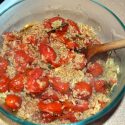The 411 on Whole30

It’s that time of the year again! Year after year, the most popular New Year’s resolutions have to do with weight loss and becoming healthier. Dieting is one of the most common strategies people use to try to achieve these goals. While diet is arguably the most effective way for most people to do that, which diet you choose is important! The “best” diet is really different for everyone, because it has to be something that aligns with your preferences and you can see yourself doing forever. The diet you choose should be balanced and healthy and should have some solid evidence behind it so you know it’s both safe and effective.
So what about all these diets out there anyway? Let take a closer look at one of them: the Whole30 Diet.
What is it?
The makers of the Whole30 diet claim some food groups have a negative impact on your health. They recommend stripping them from your diet for a one-month period while eating only whole foods on the approved list. Allowed foods include meat, seafood, eggs, vegetables, some fruit, and nuts and seeds. Some of the foods to avoid include added sugar of any kind, alcohol, grains, legumes, and dairy. It’s also off limits to recreate avoided foods with approved ingredients (such as pancakes, bread, and cookies).
The claim is that the 30-day experience will be so life-changing that you’ll never want to go back to your old ways again.
The review
At first glance, the Whole30 diet might seem appealing. After all, it promises some pretty dramatic results, and the foods listed as allowed are all healthy. While that may be true, several foods on the avoid list are also healthy. No one would argue that limiting added sugars and alcohol is a good idea, however grains — specifically whole grains — and legumes are also some of the healthiest foods on the planet. And while some people can’t tolerate dairy, low-fat and fat-free dairy is a healthy option for most. In other words, restricting these foods is not necessary, and there is very little evidence to support the claims made by the diet’s creators.
Diets that are very restrictive may also lack important nutrients. Depending on individual meal plans, the Whole30 diet may be deficient in calcium, vitamin D, fiber, potassium, and magnesium — though in all fairness, the Standard American Diet doesn’t fare any better (it’s SAD for a reason). These diets may also be hard to follow because of their restrictive nature and usually don’t offer long-term solutions. Whole30 does offer online support, however, which can be helpful in long-term adherence.
The Whole30 diet was ranked last for the second year in a row in the U.S. News & World Report review of the year’s most popular diets, even below the Paleo and Raw Foods diets. Ranked first, for the seventh year in a row, is the DASH diet (Dietary Approaches to Stopping Hypertension).
The bottom line
Healthy and effective diets are ones that are relatively easy to follow and are balanced, while allowing for individual beliefs and preferences. They include habits you could do forever. Diets that specify “off limits” foods, or that make fantastical claims that seem too good to be true, deserve a skeptic’s eye. And at the end of the day, everyone needs to choose what seems best to him or her. If you have any questions, we encourage you to speak with a registered dietitian or your doctor!.



